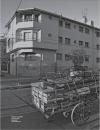Resumen
Este artículo se concentra en la Fábrica y la Población Central de Leche, en Santiago de Chile, como espacios dondeel patrimonio industrial reúne su doble dimensión material e inmaterial y, a su vez, contribuye a ampliar la memoriaobrera desde el ámbito del trabajo al de la vida doméstica. Este caso de estudio se examina en el marco de los desafíosque presenta el quehacer acerca del patrimonio industrial en Chile, tanto desde el estado del arte y de la propiadefinición conceptual, como de la carencia de acuerdos normativos para su protección.El caso de la Fábrica y la Población Central de Leche permite sugerir tres claves para fortalecer la protección delpatrimonio industrial en su dimensión inmaterial, las cuales se vinculan a una escala, temporalidad y metodologíadeterminadas. De este modo, se propone abordar este patrimonio desde una escala urbana que explique su valormás allá del recinto; en una dimensión temporal que permita recuperar la memoria viva de espacios cuyo uso originaldesaparece, y con una metodología en la que interactúen diversas disciplinas tanto para su estudio como parasu valoración.La revista Apuntes se encuentra registrada bajo la licencia Creative Commons Reconocimiento 4.0 Internacional. Por lo tanto, esta obra se puede reproducir, distribuir y comunicar públicamente en formato digital, siempre que se reconozca el nombre de los autores y a la Pontificia Universidad Javeriana. Se permite citar, adaptar, transformar, autoarchivar, republicar y crear a partir del material, para cualquier finalidad (incluso comercial), siempre que se reconozca adecuadamente la autoría, se proporcione un enlace a la obra original y se indique si se han realizado cambios. La Pontificia Universidad Javeriana no retiene los derechos sobre las obras publicadas y los contenidos son responsabilidad exclusiva de los autores, quienes conservan sus derechos morales, intelectuales, de privacidad y publicidad.
El aval sobre la intervención de la obra (revisión, corrección de estilo, traducción, diagramación) y su posterior divulgación se otorga mediante una licencia de uso y no a través de una cesión de derechos, lo que representa que la revista y la Pontificia Universidad Javeriana se eximen de cualquier responsabilidad que se pueda derivar de una mala práctica ética por parte de los autores. En consecuencia de la protección brindada por la licencia de uso, la revista no se encuentra en la obligación de publicar retractaciones o modificar la información ya publicada, a no ser que la errata surja del proceso de gestión editorial. La publicación de contenidos en esta revista no representa regalías para los contribuyentes.


